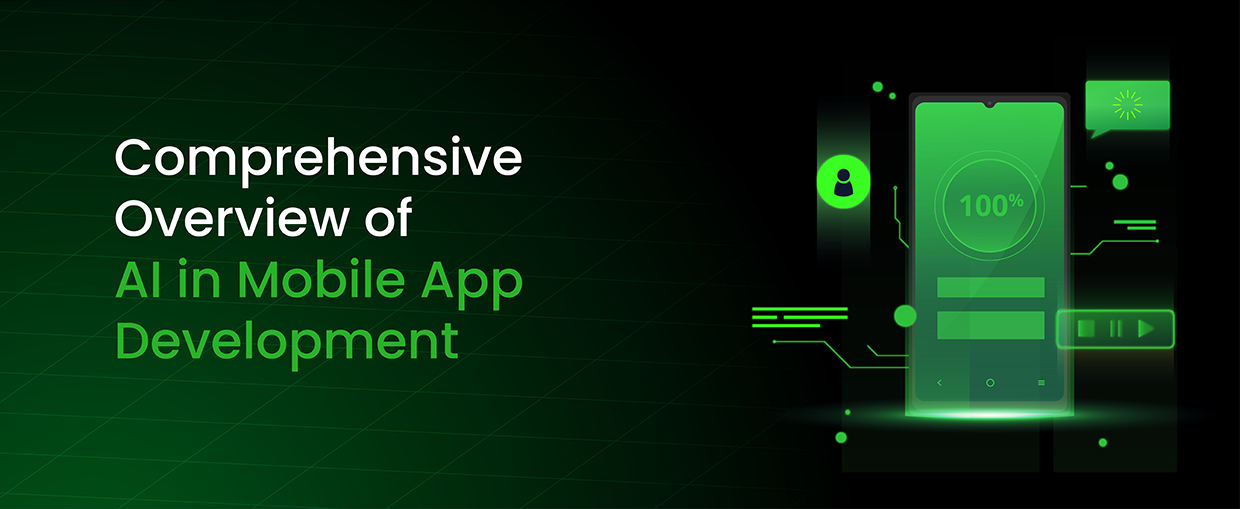The advent of AI has reimagined what technology can do, setting off a wave of transformation across industries. This includes mobile app development as well. AI is turning mobile apps into smarter, responsive, and customized user experiences by analyzing large quantities of data and making decisions based on that data. AI offers enormous potential for future mobile app development and is making mobile apps more intuitive and user-friendly through chatbots, predictive maintenance, and language translation. Explore how AI in Mobile App Development is unlocking advanced capabilities and transforming the industry.
Like AI, mobile app development is also witnessing unprecedented success. By 2027, the global app market is projected to have grown by 8.83% to reach $673.80 billion. Leveraging AI in mobile app development will only serve to enhance the promise of the industry.
Let’s take a closer look at AI in mobile app development, its benefits, use cases, and a few key future trends.
What is the Role of AI in Mobile App Development?
Artificial intelligence is a synthetic form of human intelligence that mimics human behavior and thought patterns. Machine learning is a subset of artificial intelligence that makes use of algorithms, statistical models, and big datasets to provide insight and encourage informed decision-making.
Mobile applications that use artificial intelligence technologies utilize a machine’s capacity to understand and respond to inputs in order to provide the optimal user experience. AI may also gather vital information from mobile phones, including location, contacts, and daily activities in order to improve user engagement and address challenging issues. By examining user behavior and interactions, AI-enabled apps are able to gather and store data. This capability can help with the development of mobile apps that can better fulfill the needs of users.
Benefits of AI in Mobile App Development
Personalized User Experience – AI systems can offer highly customized information and recommendations by examining user interactions, preferences, and historical data. AI customizes the app experience for every user, making it more relevant and engaging whether it be through product, content, or news article recommendations.
Enhanced User Interfaces – The user interface (UI) of mobile apps can be made more intuitive and effective with AI. For instance, natural language processing (NLP) and speech recognition technologies make voice-controlled interfaces possible, which increases the ease of use and accessibility of apps.
Automation – A lot of tedious and repetitive operations can be automated by AI-powered tools and algorithms, allowing developers to concentrate on the more important aspects of app development.
Increased Efficiency – In most cases, AI enables mobile apps to complete tasks more quickly than humans. AI gives businesses the ability to increase their productivity in a variety of areas, including data processing, customer service, and workflow management.
Improved Security – AI is essential for improving the security of mobile apps. It can safeguard user data and privacy by instantly identifying and reacting to security risks.
Use Cases of AI in Mobile App Development
1. Automated Chatbots
Offering a seamless user experience is key to staying ahead of the competition. Utilizing AI in mobile app development lets you implement automated chatbots for customer support and product recommendations. The technology can help streamline searches, retrieve relevant information, and deliver it to the customer. AI can therefore enhance every aspect of your customer service experience and expand your customer base.
2. Predictive Analytics
Analytics is an essential part of any business. Analyzing your performance, gaining knowledge, and using it to enhance your product or service is extremely important for your business. With the use of AI, you can examine customer usage data, including search activity, to make precise forecasts. This enables you to offer tailored recommendations, customize the experience, and enhance the app’s overall functionality.
3. Voice Recognition
Voice recognition is an important aspect of AI in mobile app development. It enables spoken interactions between the app and the user, which is significantly more convenient and accessible than typing. Although voice recognition technology has been around for a while, it has recently become more accurate and responsive due to developments in machine learning and natural language processing (NLP).
4. User Experience
Mobile apps with AI capabilities can assist your business in accurately understanding consumer data and preferences. Additionally, it provides comprehensive, data-rich insights to assess business performance and customer behavior. Businesses can make strategic decisions to provide higher-quality services when they have access to high-quality insights.
5. Language Translation
Using AI in mobile app development enables real-time translation of the app’s content into multiple languages. Additionally, the apps will be able to interact with users in a natural and human-like manner by integrating AI technology. The outcome of this advanced interpretation will be a more dynamic and engaging consumer experience.
Future Trends of AI in Mobile App Development
1. Augmented Reality (AR)
Combining AI with AR can make user experiences more engaging and immersive. For example, the IKEA app utilizes AR to let users view how a piece of furniture would look in their home.
2. Predictive Maintenance
By analyzing data from IoT devices, artificial intelligence (AI) can predict when maintenance is necessary, reducing the risk of malfunctions and increasing operational effectiveness.
3. Sentiment Analysis
AI models will recognize and react to user emotions and feelings conveyed by speech, text, or facial expressions within mobile apps. Thanks to this capability, users can enjoy more personalized and responsive app experiences.
4. Predictive Analytics
Mobile apps can now analyze large volumes of user data to predict patterns, user behavior, and possible issues. By enabling developers to make data-driven decisions, this knowledge keeps you ahead of the curve in terms of consumer expectations.
5. Explainable AI
Explainable AI enables the AI system to provide explanations for its decisions and the logic behind them in a way that humans understand. This is especially crucial in fields like healthcare, finance, and education where the choices made by AI could have a big impact.
6. Conversational AI and Chatbots
As natural language processing advances, chatbots and virtual assistants will be able to understand queries and provide human-like responses in a variety of languages. AI chatbots can significantly improve user engagement by offering quick responses, personalized assistance, and real-time communication.
Key Takeaways
All in all, the future of mobile app development is looking up, and embracing AI for mobile app development can offer you a much-needed competitive edge in the cutthroat market of app development. You can leverage the power of AI in mobile app development by partnering with an experienced and reliable AI development company that offers top-notch mobile app development services.




One Response
This piece is a perfect blend of intellect and heart. The ideas you present are complex, but you navigate them with such ease that it feels like you’re inviting the reader to walk alongside you, step by step, through a maze of thought and emotion. It’s the kind of writing that challenges you and comforts you all at once.